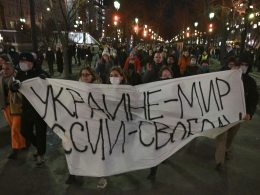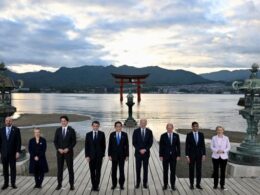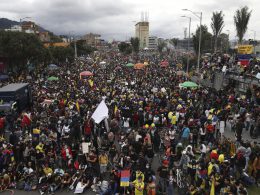The UN Security Council’s majority decision to impose a “no-fly zone”, while greeted with joy on the streets of Benghazi and Tobruk, was in no way intended to defend the Libyan revolution. The air strikes’ mounting civilian toll is leading to growing questioning of these attacks that is leading to pressure on governments, like South Africa, that originally supported, or abstained on, the UN decision, to distance themselves from what is taking place.
The longer this situation continues, the more questioning and opposition will develop. Already many workers, youth and others are disgusted by the hypocrisy of governments proclaiming their willingness to defend Libyans while doing nothing when civilians are shot down in Bahrain and the Yemen. The western powers’ silence on Saudi Arabian backing for the Bahraini elite’s bloody repression confirms, in the eyes of many, that what they wish for in Libya is for that oil rich country to also become a client state.
Revolutionaries in Libya may think that this UN decision will help them, but they are mistaken. The growing jockeying for positions and tensions between the main attacking powers reveal the naked economic and political calculations that lay behind the imperialist powers’ decision. It is not a lifeline that could ‘save’ the revolution against Gaddafi. The major imperialist powers decided that they wanted now to exploit the revolution, gain control over its leadership and thus try to replace Gaddafi with a more reliable (for them and their interests) regime. And they hoped that this demonstration of their military power would warn the Arab masses not to go “too far” in their revolutions.
But almost immediately it has become clear that the imperialist powers hope of a quick victory is disappearing. On the one hand, the forces around Gaddafi for the moment appear to be holding firm while the rebel forces seem unable to advance around the Gulf of Sirte, let alone towards Tripoli.
This is the background to the growing tensions between the attacking powers, especially the arguments over who is controlling the operation, whether or not NATO should be involved and over what their overall aim should be. Some fear that they may get involved in a ground war, or that the country could break up. All of which is aggravated by the rivalries and competition between the attacking powers. At the same time, as being divided over what to do, the imperialist powers are fearful of the effects of their intervention both in Libya and throughout the Arab world.
The stalling of the revolution is symbolised by the weakness of the self-appointed leadership of the “Interim Transitional National Council” (ITNC) which is dominated by recent defectors from Gaddafi and pro-capitalist elements. This body seems incapable of appealing to the masses in western Libya and is increasingly relying on the imperialist powers for aid. What has been missing is independent organisations of Libyan workers and youth that could give a clear direction to the revolution in order to win democratic rights, end corruption and secure for the mass of Libyans democratic control over, and benefit from, the country’s resources.
Faced with a rapid eastwards advance of Gaddafi’s forces, many in eastern Libya seized hold of the idea of a “no-fly zone” to help stem this tide, but this is not the way to defend and extend a genuine revolution in the working masses’ interests. We have seen false hopes in the power of intervention many times before, for example, in 1969, in Northern Ireland, where some on the Left thought that the British army would protect Catholics and provide a “breathing space”. While the intervention in Libya initially beat back an attack on Benghazi, it is clear that the attacking powers, with their growing calls for Gaddafi’s removal, are already starting to try to shape the character of any post-Gaddafi Libya. For the ruling classes in the US, Britain, France and elsewhere, their goal is a pliant country open to exploitation.
The regime was able to mount a counter-attack because the uprising’s initial drive towards the west, where two-thirds of Libyans live, was not based on a clear revolutionary appeal to the working masses. Despite mass support in the east there was no organised mass movement, built upon popular, democratic committees that could offer a clear programme to win support from the mass of the western population and rank and file soldiers whilst waging a revolutionary war. This gave Gaddafi an opportunity to regroup.
The growth in support for a no-fly zone was a reversal of the sentiment expressed in the English language posters put up in Benghazi in February declaring, ‘No to Foreign Intervention – Libyans can do it by themselves!’. This followed the wonderful examples of Tunisia and Egypt where sustained mass action completely undermined totalitarian regimes. The Libyan opposition masses were confident that their momentum would secure victory. But, at least partly due to the character of the opposition’s leadership, Gaddafi was able to retain a grip in Tripoli, the largest city of nearly 1.8 million. The combination of this relative stabilisation of the regime and its counter-offensive led to a change in attitude amongst the opposition towards foreign intervention that allowed the largely pro-Western ITNC to overcome youth opposition to asking the West for aid.
However, despite the Gaddafi regime’s blood-curdling words, it is not at all certain that its relatively small forces could have launched an all-out assault on Benghazi, Libya’s second largest city, with over a million living in its environs. A mass defence of the city would have blunted the attack of Gaddafi’s relatively small forces, especially if combined with an appeal to those forces to join the revolution. But to do this successfully the revolution would have to be clearly seen as standing for political freedom and offering a way forward for Libyan society. But the ITNC is incapable of doing this and there was no independent movement of workers and youth who could give such a lead. Now, if a stalemate develops and Gaddafi remains in power in Tripoli, it could mean a de facto breakup that goes back to the separate entities that existed before Italy first created Libya after 1912 and Britain recreated it in the late 1940s.
Aspirations of the revolution
But, whatever effects this no-fly zone and military intervention has, any trust placed in either the UN or the imperialist powers threatens to undermine all the genuine hopes and aspirations of the revolution that began in February. This is because the powers that have decided this are no friends of the Libyan masses. Until recently they were quite happy to deal with, and pander to, the murderous Gaddafi clique in order to maintain a partnership, especially in oil and gas. Indeed, the day after the UN took its decision, the Murdoch-owned ‘Wall Street Journal’ lamented that, “the close partnership between the Libyan leader Col. Muammar Gaddafi’s intelligence service and the CIA has been severed” (March 18, 2011). The ‘Journal’ reported that, “according to a senior US official,” this was “especially productive” – something confirmed by secret US material published on Wikileaks.
Now, having lost Mubarak and Ben Ali, imperialism is trying to take advantage of the popular uprising in Libya to both refurbish its “democratic” image while working to help install a more “reliable” regime in Libya, or at least a part of Libya. North Africa and the Middle East, with its oil and strategic location, are of tremendous importance to the imperialist powers. Libya with its oil reserves – the largest in Africa and ninth largest in the world – is a special prize as its low population and its geography make it easier to exploit.
However the attackers’ propaganda actually again reveals the absolute hypocrisy of the main imperialist powers that have shamelessly supported repressive dictatorial regimes throughout the Middle East. There was not even a hint of a “no fly zone” or “protecting civilians” during the Israeli government’s 2008/9 attack on Gaza; instead their lips were sealed. For millions in the Middle East, the US and British reaction to the attack on Gaza, alongside the invasions of Iraq and Afghanistan, are the measures by which the intentions of these powers are judged.
Now, at the very same time that these powers were deciding the no-fly zone, they did absolutely nothing to practically prevent Saudi Arabia and their Gulf allies’ increasingly brutal suppression of the majority of the Bahraini population and attempt to foment sectarianism. Within 12 hours of the UN decision, the forces of the major powers’ Yemeni ally shot dead at least 40 protesters in the capital, Sanaa. The UN was only able to take its decision on Libya because the Arab League supported a no-fly zone. Yet, despite sometimes having to dimly reflect popular opinion, this body is in no way representative of the Arab masses. It is a collection of mainly reactionary autocrats who themselves rule by repression, as seen most recently in Bahrain and Yemen. The imperialist powers are very clear about not upsetting these rulers. British ministers, for example, speak about the need for “freedom of expression” in the Middle East, trying not to mention the word “democracy”.
The “concern” of Cameron and Sarkozy for Libya is at least partly motivated by domestic unpopularity and the hope that a foreign success will strengthen their standing. Cameron clearly hopes for a boost similar to that which Thatcher enjoyed after her victory in the 1983 Falklands/Malvinas War, but Thatcher achieved a quick military victory and simply a no-fly zone will not produce a similar military victory. Sarkozy, after the disaster of his Tunisia policy that led to the resignation of his Foreign Minister, needs a “success” to lift his low poll ratings as next year’s presidential election looms closer. After originally opposing the Tunisian and Egyptian revolutions, Sarkozy now suddenly “supports” the Libyan opposition and recognises it as the legitimate government, probably with an eye to it helping French companies get their hands on Libyan oil and gas.
Despite the imperialist powers’ rapprochement with Gaddafi after 9/11, he remained an unreliable ally. Throughout his nearly 42 years in power Gaddafi’s policies have zig-zagged, sometimes violently. In 1971 he helped the then Sudanese dictator Nimeiry crush a coup led by leftist officers that took place in reaction to the earlier suppression of the left, including the banning of the one million member Sudanese Communist Party. Six years later, Gaddafi proclaimed a “people’s revolution” and changed the country’s official name from the Libyan Arab Republic to the Great Socialist People’s Libyan Arab Jamahiriyah. But despite this change in name, and the formation of so-called “revolutionary committees”, this was not genuine democratic socialism or a move towards it. The Libyan working people and youth were not running their country. Gaddafi remained in control, something underlined by the increasingly prominent role that many of his children played in the regime.
Gaddafi’s first reaction to this year’s dramatic revolutionary events was to side with the dictatorial, corrupt autocrats. Just after Ben Ali fled from Tunisia, Gaddafi told Tunisians that they had “suffered a great loss” because “there is none better than Ben Ali to govern”. Perhaps revealing how he viewed his own future, Gaddafi added that he had hoped that Ben Ali would rule “for life”.
Nevertheless it cannot be ignored that, since 1969, on the basis of a large oil income and a small population, there has been a big improvement in most Libyans’ lives, especially in education and health. This is something which at least partly explains why Gaddafi still has some basis of support amongst the population. Even while there is growing opposition to the Gaddafi clique, especially amongst Libya’s overwhelmingly young, educated and urban population, there is also a fear of who might replace him and opposition to anything that smells of foreign rule. Libyans know the second line of the US Marine Corps Hymn, “to the shores of Tripoli”, referring to an earlier, 1803 intervention. The revolutionaries’ widespread use of the old monarchy’s flag was bound to alienate those who do not want to return to the past and was used by Gaddafi to justify his rule. Additionally, flying this old flag risks alienating Libyans from the west of the country as the former king came from the east and had no historic roots in the area around Tripoli.
But these factors are not a complete explanation of why Gaddafi was able to stabilise his position before the Western intervention and, at least temporarily, sections of the Libyan military kept fighting. While there was a popular uprising in eastern Libya, Gaddafi was able to maintain his positions in the west, where two-thirds of the population live, despite large protests in Tripoli and uprisings in Misrata, Zuwarah and a few other areas. This was a result both of the way in which the revolution unfolded and of Libya’s history.
Role of the Working Class
Unlike Egypt and Tunisia the working class in Libya has not, so far, begun to play an independent role in the revolution. Furthermore many workers in Libya are migrants who have fled the country in recent weeks.
The absence of a national focal point which, for example, the Tunisian UGTT trade union federation provided (despite its pro-Ben Ali national leadership), complicated the situation in Libya. The huge revolutionary enthusiasm of the population has not, so far, been given an organised expression. The largely self-appointed “National Council” that has emerged in Benghazi is a combination of elements from the old regime and more pro-imperialist elements. For example the Council’s foreign spokesman, Mahmoud Jibril, the former head of Gaddafi’s National Economic Development Board, was described by the US Ambassador in November 2009 as a “serious interlocutor who ‘gets’ the US perspective” i.e. someone the US can work with.
It is easy for Gaddafi to present these type of people as threats to Libyans’ living standards and as agents of foreign powers. At the same time the effect of this propaganda will be limited due to a steady worsening of the population’s living standards and continued 10% unemployment since the end of the 1980s oil boom and, particularly, after the start of privatisation back in 2003. Now, in addition to anti-imperialist rhetoric, Gaddafi has made concessions to maintain support. Each family has been given the equivalent of $450. Some public sector workers have been given 150% wage increases and taxes and customs duties on food have been abolished. But these steps do not wipe away all that has happened over the past years. Furthermore they do not answer the demands for real democratic rights or end to the growing frustration of Libya’s youthful population – with an average age of 24 – against the regime’s corruption and suffocating grip.
Gaddafi’s use of the threat of imperialist intervention to divide the country did gather some support. Now it may gain more backing if the air attacks continue and widen out to civilian targets, as happened in Serbia in 1999, and if the country does actually become divided. Gaddafi’s promise that, “If needs be, we will open all the arsenals”, indicates that he can attempt to rest on anti-colonial feelings or simply try to threaten imperialism that it is “me or chaos”. Gaddafi will try to make sure he or his family keeps hold of the reins of power, but an impending defeat could persuade more of his top officials to jump ship and join the INTC.
Internationally, tens upon tens of millions of people have followed and been inspired by the revolutions in North Africa and the Middle East. Already these revolutions have inspired protests against the effects of the capitalist crisis in many countries. Because of this, and Gaddafi’s advance on Benghazi, there was popular support in some countries for the “no fly zone”, but this is already starting to be questioned as the bombing continues. Even the leaders of the Arab League are trying to back away from being too closely associated with what is happening.
How to aid the revolution?
But what then can be done to genuinely help the Libyan revolution internationally? Firstly, there can be no support for the “no fly zone” and military intervention. It is not in the interests of the Libyan people. On its own the “no fly zone” will not automatically lead to the overthrow of Gaddafi. In fact, like Saddam Hussein, he could entrench his position for a time in those parts of the country his regime controls, so long as the intervention did not go onto the offensive.
However the growing unofficial Western calls for ‘regime change’ show that sections of the imperialist powers are looking to use their intervention to create a client regime that will, they hope, extinguish the fires of revolution, at least in Libya. This is why the support by some Lefts for this intervention is mistaken and dangerous. Such support poses the danger not just of the revolution being derailed but also of being cut off from those Libyans who, while not fully supporting Gaddafi, genuinely wish to fight colonialism and imperialism.
The imminent attack on Benghazi clearly panicked a section of the Left internationally, ranging from the members of the GUE/NGL group in the European Parliament, Die LINKE in Germany, the Left Bloc in Portugal, to some of the followers of the late Ernest Mandel in the ‘Fourth International’ (FI) and other smaller groupings. A Swedish ‘FI’ member, Andreas Malm, argued that if the right-wing Swedish government sent military aircraft, “they – in fact – (would) put themselves on the side of the revolution”. A small British grouping, the Alliance for Workers’ Liberty, argues that, “Socialists either address this, real life-and-death question or they are irrelevant poseurs” and “to oppose – that is, demonstrate against, and make a serious effort to prevent – the limited military action against Gaddafi, is to tell the rebels in Benghazi ‘you’re on your own’”.
But those on the Left who argue that “there is no realistic alternative” to stop Gaddafi’s attacks are precisely ignoring what happened in Tunisia and Egypt, namely that a determined mass movement of the working masses and youth can overthrow a dictatorship. Support for the imperialists’ intervention works against building such a movement and furthermore gives a propaganda gift to Gaddafi.
It is true that the intervention has received popular backing in eastern Libya. The same was true when British troops went onto the streets of Northern Ireland in 1969 and when the Indian army moved into Sri Lanka in 1987. The CWI, while understanding these sentiments, also understood that they would not last, and argued not simply against the military interventions but for a positive programme to build a working class-led movement that could provide a socialist way out of the crisis.
After a delay, the leadership of the ‘Fourth International’ distanced themselves from their members, especially in Sweden and France, supporting the UN decision and declared that the ‘FI’ opposed the military intervention in Libya. However the ‘FI’ leaders did not give any indication of what, apart from solidarity and giving practical aid, needed to be done in Libya to defend the revolution from Gaddafi’s clique, imperialist intervention and the pro-capitalist elements seeking to limit the revolution from within.
Of course, opposition to this imperialist attack and practical solidarity with the Libyan workers and youth needs to be urgently organised. Trade unions internationally need to block the export of Libyan oil and gas. Bank workers should organise the freezing of all the Gaddafi regime’s financial assets.
A revolutionary programme
However, the fate of the revolution will be decided inside Libya itself. Its victory requires a programme that can cut across tribal and regional divisions and unite the mass of the population against the Gaddafi clique and in the struggle for a better future.
There can be no support for the imperialist intervention, despite its UN colouring. The Libyan working masses and youth should show no trust whatsoever in the so-called democratic powers. They need to always remember that up until a few weeks ago the US, Britain, France etc. were friends of Gaddafi and are still friends and allies of dictators and rotten regimes across the Arab world.
A programme for the Libyan revolution that will genuinely benefit the mass of the population would be based on winning and defending real democratic rights, an end to corruption and privilege, the safeguarding and further development of the social gains made since the discovery of oil, opposition to any form of re-colonisation and for a democratically controlled, publicly owned economy planned to use the country’s resources for the future.
The creation of an independent movement of Libyan workers, poor and youth that could implement such a real revolutionary transformation of the country is the only way to thwart the imperialists’ plans, end dictatorship and transform the lives of the mass of the people.












